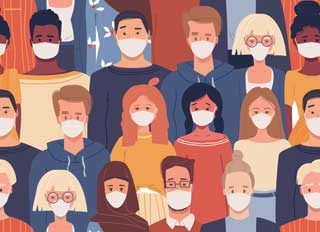The Word from Lansing: Living Care for One Another

Posted May 21, 2020
Five years ago, Pope Francis wrote that society must “regain the conviction that we need one another, that we have a shared responsibility for others and the world” (Laudato Si). During the Coronavirus (COVID-19) pandemic and the economic challenges that have accompanied it, Catholics across the state understand more clearly the importance of the Holy Father’s words.
These days, Michiganders have regular opportunities to be reminded that we need one another; we have regular opportunities to see how our actions impact others. While this connection unfortunately has been demonstrated through the rapid spread of the illness, it has also been visible in efforts to “flatten the curve” and to protect the vulnerable, especially the elderly and those with underlying medical conditions.
Sadly, all have been touched by COVID-19 in some fashion. The contagious nature of the virus has significantly influenced how people across the state feel (physically and mentally), where they can go, who they see, and the manner by which they can work or attend school, if at all. Government and community leaders have had to weigh difficult considerations, including how best to protect public health while addressing mental health, safety, economic, and educational needs. These decisions are not easy.
To assist in the fight against COVID-19, federal lawmakers have passed a series of bills. Back in March, as the U.S. Congress debated what financial assistance to include in the measures, the U.S. Conference of Catholic Bishops (USCCB) urged legislators to keep in mind the needs of the most vulnerable. They also asked for the funding to prioritize urgent health care resources across the country, to consider the needs of nonprofit and for-profit organizations and employees, and to ensure that nonpublic schools were included alongside their public-school counterparts for financial assistance. More legislation is likely forthcoming. However, three measures that have already become law include:
- The Coronavirus Preparedness and Response Supplemental Appropriations Act, which includes funding to prepare a COVID-19 vaccine, to assist U.S. embassies and other State Department facilities in response efforts, and to provide aid to health systems in affected countries.
- The Families First Coronavirus Response Act, which allows COVID-19 testing to be provided free-of-charge, expands food assistance and unemployment benefits, offers temporary childcare leave and paid sick leave for certain employees, and increases Medicaid funding for states.
- The Coronavirus Aid, Relief, and Economic Security Act (CARES), which provides emergency relief, including direct payments to individuals under a certain income level; extended unemployment insurance benefits; support to improve overall capacity in hospitals and health care centers; small business loans; loans for governments, cities, and larger corporations; and funding for public and nonpublic schools to address needs during the pandemic, such as sanitizing buildings and purchasing technology for distance learning.
The Michigan Legislature has also passed millions in state aid, which has been allocated to control the spread of the infection and to provide for necessary medical resources. Emergency relief has the ability to make a significant difference for individuals, communities, and businesses, but it is important to remember that gaps still exist. Families are still struggling, and for many Michiganders, especially for those that have lost jobs, relief still feels far away.
As Pope Francis pointed out, connection, support, and actions that reaffirm the dignity of every person should be our answer. These activities can help step into that gap. As communities seek to protect lives during this COVID-19 pandemic, it is clear that the work performed by Catholic charitable agencies, places of worship, pregnancy resource centers, anti-poverty programs, and other initiatives that empower the marginalized is—and will be—needed more than ever. At the same time, Michiganders benefit from leaning on and reaching out to one another, be it virtually or physically.
During this difficult time, it is clear we do need each other. We do have a shared responsibility for one another. Let us continue, as the Holy Father indicated five years ago, to carry out that responsibility to live and care for one another in creative ways, for the common good of all.
